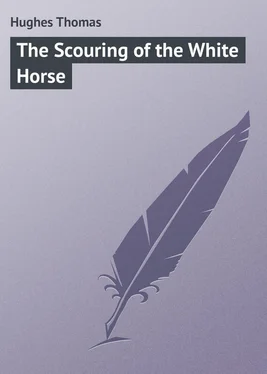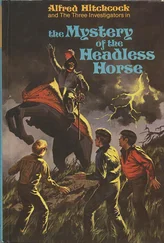Thomas Hughes - The Scouring of the White Horse
Здесь есть возможность читать онлайн «Thomas Hughes - The Scouring of the White Horse» — ознакомительный отрывок электронной книги совершенно бесплатно, а после прочтения отрывка купить полную версию. В некоторых случаях можно слушать аудио, скачать через торрент в формате fb2 и присутствует краткое содержание. Жанр: foreign_prose, на английском языке. Описание произведения, (предисловие) а так же отзывы посетителей доступны на портале библиотеки ЛибКат.
- Название:The Scouring of the White Horse
- Автор:
- Жанр:
- Год:неизвестен
- ISBN:нет данных
- Рейтинг книги:5 / 5. Голосов: 1
-
Избранное:Добавить в избранное
- Отзывы:
-
Ваша оценка:
- 100
- 1
- 2
- 3
- 4
- 5
The Scouring of the White Horse: краткое содержание, описание и аннотация
Предлагаем к чтению аннотацию, описание, краткое содержание или предисловие (зависит от того, что написал сам автор книги «The Scouring of the White Horse»). Если вы не нашли необходимую информацию о книге — напишите в комментариях, мы постараемся отыскать её.
The Scouring of the White Horse — читать онлайн ознакомительный отрывок
Ниже представлен текст книги, разбитый по страницам. Система сохранения места последней прочитанной страницы, позволяет с удобством читать онлайн бесплатно книгу «The Scouring of the White Horse», без необходимости каждый раз заново искать на чём Вы остановились. Поставьте закладку, и сможете в любой момент перейти на страницу, на которой закончили чтение.
Интервал:
Закладка:
Thomas Hughes
The Scouring of the White Horse / Or, The Long Vacation Ramble of a London Clerk
OLD AND NEW
See how the Autumn leaves float by, decaying,
Down the red whirls of yon rain-swollen stream;
So fleet the works of men, back to their earth again;
Ancient and holy things fade like a dream.
Nay! see the Spring blossoms steal forth a-maying,
Clothing with tender buds orchard and glen;
So, though old forms go by, ne’er can their spirit die.
Look! England’s bare boughs show green leaf again.
PREFACE
The great success of the festival (or “pastime,” as it is called in the neighbourhood) which was held on White Horse Hill on the 17th and 18th of September, 1857, to celebrate the “Scouring of the Horse,” according to immemorial custom, led the Committee of Management to think that our fellow-county-men at least, if not our countrymen generally, would be glad to have some little printed memorial, which should comprise not only an account of the doings on the Hill on the late occasion, but should also endeavour to gather up the scattered legends and traditions of the country side, and any authentic historical notices relating to the old monument, of which we west-countrymen are all so fond and proud.
I had the good or ill luck (as the case may be) to be the only member of the Committee whose way of life had led him into the perilous paths of literature; so the task of compiling and editing our little book was laid on my shoulders.
Installed as chronicler to the White Horse, I entered with no ill will on my office, having been all my life possessed, as is the case with so many Englishmen, by intense local attachment, love for every stone and turf of the country where I was born and bred. But it is one thing to have zeal, and another to have discretion; and when I came to consider my materials, I found that the latter quality would be greatly needed. For, what were they? One short bright gleam of history from the writings of old monks a thousand years ago; traditions and dim legends, which I and most Berkshire men have always faithfully believed from our youth up, and shall go on believing to our dying day, but which we could hardly put before general readers in serious narrative; a dry notice here and there by some old antiquary of the seventeenth or eighteenth century; stories floating in the memories of old men still living; small broad-sheets from country town presses, with lists of the competitors for prizes at rustic games, newspaper articles, remarks by Committee-men and umpires, scraps of antiquarian lore; abuse of the Great Western Railway for not allowing the trains to stop, bits of vernacular dialogue, and odd rhymes. What could be done with them all? How out of the mass could a shapely book be called out, fit to be laid before a fastidious British public, not born in Berkshire?
Not exactly seeing how this was to be done, the only honest course which remained, was to follow the example of a good housewife in the composition of that excellent food called “stir-about” – throw them altogether into the pot, stir them round and round with a great spoon, and trust that the look of the few great raisins, and the flavour of the allspice, may leaven the mass, and make it pleasing to the eye and palate; and so, though the stir-about will never stand up in a china dish by itself, it may, we hope, make a savoury and pleasant side dish, in a common soup tureen.
The raisins, and those of the best quality, have been furnished by the great artist 1 1 Doyle.
who has kindly undertaken to give us pictures; the allspice has been contributed by the Committee and other kind friends, and I have done the milk and meal, and the stirring. The responsibility therefore rests with me, though the credit, whatever it may be, rests with others. But let me insist here, at once, that if there be any failure in the dish, it is the fault of the dresser and not of the subject-matter.
For, suppose an intelligent Englishman to be travelling in France, and to find the whole population in the neighbourhood of Tours turning out in their best clothes for a two days’ holiday on a high hill, upon which the rude figure of a huge hammer is roughly sculptured. On inquiry, he finds that the figure has been there long before the memory of the oldest man living, but that it has always been carefully preserved and kept fresh; and although there is no printed history of how it came there, yet that all neighbouring men, of whatever degree, associate it with the name of Charles Martel and his great victory over the Saracens, and are ready one and all to rejoice over it, and to work and pay that it may go down to their children looking as it does now. Or, to come to much later times, let our traveller find an eagle cut out on a hill in Hungary, similarly honoured, and associated with the name of Eugene, and the memory of the day
“When, the old black eagle flying,
All the Paynim powers defying,
On we marched, and stormed Belgrade.”
Should we not all thank him for giving us the best account he could of the figure, the festival, and all traditions connected with them; and think he had fallen on a very noteworthy matter, and well worth the telling when he got back to England?
Well, here we have the same thing at our own doors; a rude colossal figure cut out in the turf, and giving the name to a whole district; legends connecting it with the name of our greatest king, and with his great victory over the Pagans, and a festival which has been held at very short intervals ever since the ninth century. Rich as our land is in historical monuments, there is none more remarkable than the White Horse; and in this belief we put forth this little book in his honour, hoping that it may perhaps fix upon him, and the other antiquities which surround him, the attention of some one who can bring science and knowledge to bear upon the task to which we can only bring good will.
For, alas! let me confess at once, that in these qualities our book is like to be sadly deficient. The compiler has no knowledge whatever of the Anglo-Saxon tongue, or of Saxon or other antiquities. There is indeed of necessity a semblance of learning and research about the chapter which tells the history of the battle of Ashdown, because the materials for it had to be collected from a number of old chroniclers, whose names will be found in the foot-notes. But any fifth-form boy, with industry enough to read about 200 small pages of monkish Latin, may master the whole for himself in the originals in a week; and for those who cannot do this, there is the jubilee edition of the chroniclers, put forth by the Alfred Committee in 1852, where a translation of the old fellows will be found in parallel columns, together with much learning concerning them and their times, in foot-note, preface, and appendix. This translation I have followed in all but a few passages, in which the text used by the translators has probably differed from the one which I have seen. For the Saxon Chronicle, I have used Ingram’s translation.
But while we do not pretend to be antiquaries, or historians, or learned men, we do claim to be honest average Englishmen, and will yield to no man in our love for our own quiet corner of the land of our birth. We do think, that whatever deeply interests us cannot fail in a degree to interest our countrymen. We are sure that reverence for all great Englishmen, and a loving remembrance of the great deeds done by them in old times, will help to bring to life in us the feeling that we are a family, bound together to work out God’s purposes in this little island, and in the uttermost parts of the earth; to make clear to us the noble inheritance which we have in common; and to sink into their proper place the miserable trifles, and odds and ends, over which we are so apt to wrangle. We do hope that our example will lead Englishmen of other counties, to cherish every legend and story which hangs round any nook of their neighbourhood, connecting it with the times and the men who have gone before; to let no old custom, which has a meaning, however rude, die out, if it can be kept alive; and not to keep either legend or custom to themselves, but (like us) to put them in the best shape they can, and publish them for the benefit of their countrymen; we of the White Horse Committee, at any rate, hereby pledging ourselves to read all such publications.
Читать дальшеИнтервал:
Закладка:
Похожие книги на «The Scouring of the White Horse»
Представляем Вашему вниманию похожие книги на «The Scouring of the White Horse» списком для выбора. Мы отобрали схожую по названию и смыслу литературу в надежде предоставить читателям больше вариантов отыскать новые, интересные, ещё непрочитанные произведения.
Обсуждение, отзывы о книге «The Scouring of the White Horse» и просто собственные мнения читателей. Оставьте ваши комментарии, напишите, что Вы думаете о произведении, его смысле или главных героях. Укажите что конкретно понравилось, а что нет, и почему Вы так считаете.












